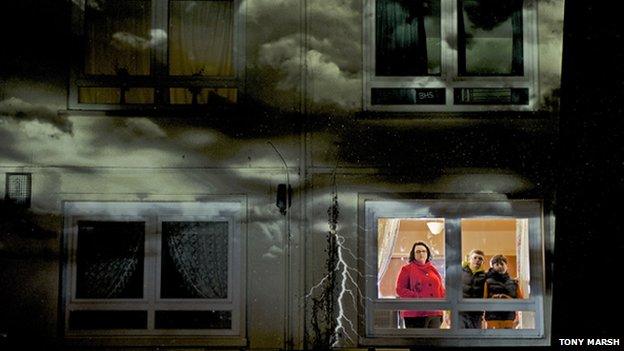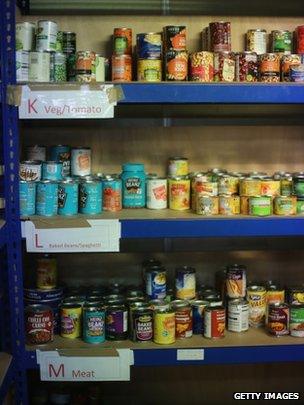Charities claim Scotland faces 'humanitarian crisis' caused by poverty
- Published
- comments

The Scotland's Outlook campaign aims to raise awareness of what it claims are rising levels of poverty across Scotland
A campaign aimed at highlighting the "humanitarian crisis" caused by poverty in Scotland has been launched by a group of charities.
The Scotland's Outlook campaign claimed hundreds of thousands of people were being "battered" by welfare reforms, stagnant wages, rising utility bills, higher living costs and job insecurity.
And it said many families were having to use food banks to feed themselves.
It called on people across the country to "join the fight against poverty".
The campaign is being run jointly by Macmillan, Shelter Scotland, Oxfam, Alzheimer Scotland, Children's Hospice Association Scotland (CHAS), Child Poverty Action Group (CPAG), the Poverty Alliance and the Scottish Council for Voluntary Organisations (SCVO).
It claimed more than 870,000 people in Scotland were living in poverty, with a fifth of children in Scotland living below the breadline and 23,000 people having turned to food banks in the past six months.
Martin Sime, chief executive of the SCVO, said: "With nearly a million people in Scotland living in poverty, we have a humanitarian crisis on our hands and we need everyone's help to tackle it.
"Thousands of people are turning to food banks, struggling to heat their homes, and to clothe themselves and their children. It's not right.
"We want people to wake up to the poverty storm that's engulfing Scotland and get active in the fight against it."
Graeme Brown, director of Shelter Scotland, said: "People across Scotland are being battered by welfare reforms, stagnant wages, rising utility bills, higher living costs and job insecurity.
"Set against the background of 155,100 households on council waiting lists and nearly 40,000 homelessness applications last year, it is clear that much more needs to be done to combat the root causes of poverty if we are to improve the prospects for everyone living in Scotland."

Charities said many families were using foodbanks
"We see and hear the misery poverty causes every day. Not only does it have a devastating impact on home life, it has long-term detrimental effects on people's health, wellbeing and life chances - especially children."
The campaign said a key issue was easing the financial burden of childcare in order to make it easier for parents to work.
Hazel, a lone parent living in Fife, said: "I did not want to be a single mum on benefits, like you see on the news. Those mums were portrayed as lazy scroungers and I definitely was not like that.
"I really wanted to work but every way I turned I was hit with barriers and this made accessing employment so difficult. Childcare was so expensive and not readily available in my area."
She added: "I think there needs to be more support for lone parents accessing employment but from an early stage. Childcare needs to be made a priority in all areas, and it should be more affordable and easily accessible."
The campaign will use social media in an attempt to public awareness of the work they are doing to combat poverty across the country.
In a report published last month, the Joseph Rowntree foundation said child poverty in Scotland had fallen at about twice the rate of England over the past 10 years.
And official government statistics released in June said the number of people living in relative poverty had fallen slightly, from 780,000 in 2010/11 to 710,000 the following year.
But the figures from Scotland's chief statistician also showed there had been a fall in the average household earnings in Scotland, from £461 per week to £436, over the same period.
- Published4 March 2014
- Published25 February 2014
- Published2 February 2014
- Published10 December 2013
- Published20 June 2013
- Published13 June 2013